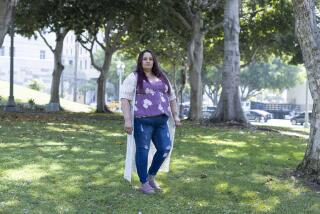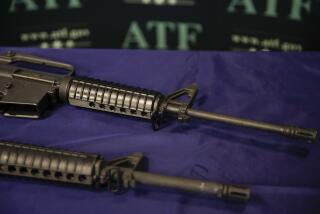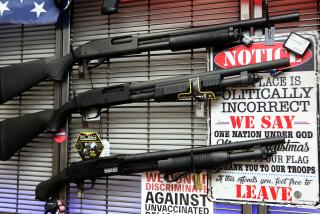$50 Bounty Spurs Firearm Disarmament : Safety: San Francisco has collected more than 1,100 guns as part of an amnesty program. Officials hope to reduce the number of shootings.
- Share via
SAN FRANCISCO — A gray-haired grandmother sat on a bench at the police station cradling a pearl-handled pistol in her lap.
She had owned the gun for 50 years, she said, but was ready to trade it for $50--and the promise that it would never fall into the wrong hands.
“My grandfather gave it to me,” she said. “He had a gun collection and he gave one to each of his grandchildren to save. But now I have grandchildren and I don’t want it. Times are different now.”
The 67-year-old woman, who asked not to be identified, was among the hundreds of people who have taken advantage of an offer from the city of San Francisco. For a limited time only, the city will buy any handgun or assault rifle in working order for $50, no questions asked.
The firearms amnesty program, as it is known, is this city’s version of disarmament. Weapons bought by the city will be melted down and, most likely, transformed into a work of art.
So far, the Police Department has collected more than 1,100 guns, including Saturday night specials, automatic pistols, single-shot derringers and a wide range of small-caliber handguns.
The idea has been so popular that the city quickly spent the first $28,500 earmarked for the program, handing out a $50 bill for each gun. Police officers are now passing out vouchers until the arrival of another $50,000 is approved by the city.
“These guns are out of circulation,” said patrolman Ed McDonough, pointing at a box of guns the Police Department had just purchased. “Each gun is one less gun some punk will get.”
The goal of the program is to reduce the number of weapons that might be obtained by criminals, found by children or taken to school by teen-agers. There were 101 murders in San Francisco last year, and officials hope that the amnesty program will reduce the number of shootings in the city.
Money for the program has been allocated from cash and other assets seized by police from drug dealers, but city officials have begun talking about trying to raise more funds from private contributors.
“I’m very excited because it has been such a tremendous success,” said Supervisor Willie Kennedy, who proposed the program. “If we can get every community in California to do something like this, I think we will see a drop in crime in the state.”
At the imposing, gray Hall of Justice that houses San Francisco’s main police station, courts and jail, a steady stream of people walked in last week carrying guns in plastic bags, boxes, paper bags and pillowcases.
“I’ve had it for over 40 years,” said Martin J. Purcell, 87, as he turned in a .380 Colt pistol. “My daughter wants me to get rid of it.”
Some who turned in guns said they were concerned about their children or grandchildren getting hold of the weapons. Others worried about firearms falling into the hands of criminals, or that their gun might be used in anger.
“I don’t want it around the house,” said a middle-aged woman who brought in a .357 magnum revolver. “There’s a lot of volatile situations in my house.”
Others simply did it for the money.
“I need 50 bucks,” said one middle-aged man as he turned in his .38-caliber revolver. “That’s a good enough reason.”
Although the program was designed for San Francisco residents, people have come from all over the Bay Area and from Sacramento to take advantage of the cash offer.
One Sacramento gun dealer drove 90 miles to the city and brought in more than 50 small-caliber pistols he described as “pieces of junk.” The Police Department paid $1,250 for 25 guns, but rejected the rest because they did not work.
“We thought it was a good way to get rid of some of them,” said the dealer’s wife, declining to give their names. “They’re what the police would probably consider Saturday night specials. If they fell into the wrong hands it would be bad.”
When the six-month program began in late October, the Police Department was buying any sort of firearm, regardless of its condition. But because of the large number of weapons turned in, the city stopped paying for rifles, shotguns or guns that were not in operating condition.
So far, police have found that 15 guns turned in had been reported stolen. They will be returned to their owners.
No one has brought in an assault rifle, police spokesman Jerry Senkir said, but one resident handed over a World War II target pistol worth $700.
San Francisco is one of a handful of cities during the last decade to buy weapons from its citizens.
Baltimore was the first city to try the idea, collecting 13,000 guns during three months in 1974. Philadelphia bought more than 1,000 guns this summer for $20 each.
In St. Louis, the Police Department has collected nearly 7,000 weapons in a monthlong program scheduled to end next week, paying $50 for handguns and $25 for rifles.
While the cities’ gun-buying programs will eliminate only a small percentage of the 200-million firearms in the United States, gun-control advocates said they could help reduce accidental shootings and make some residents think twice about keeping guns in their homes.
“I think it shows that people are really frustrated with the level of gun violence out there,” said Luis Tolley, a spokesman for Handgun Control Inc. “If this law encourages someone to turn in a weapon that is not wanted and may not be stored safely, it could do a lot of good.”
National Rifle Assn. spokesman Brian Judy said his organization had no position on the program but questioned whether it was a waste of money.
“My gut reaction is that it’s kind of a feel-good program, but I would be really surprised if it had any impact on the criminal misuse of firearms,” Judy said. “A criminal is not going to turn in his gun.”
To San Francisco Police Officer Dan Sui, the real benefit of the program may never be known. “You’re maybe saving some kid’s life,” he said as he examined several guns that had just been turned in. “You can’t put a dollar value on that.”
More to Read
Sign up for Essential California
The most important California stories and recommendations in your inbox every morning.
You may occasionally receive promotional content from the Los Angeles Times.













